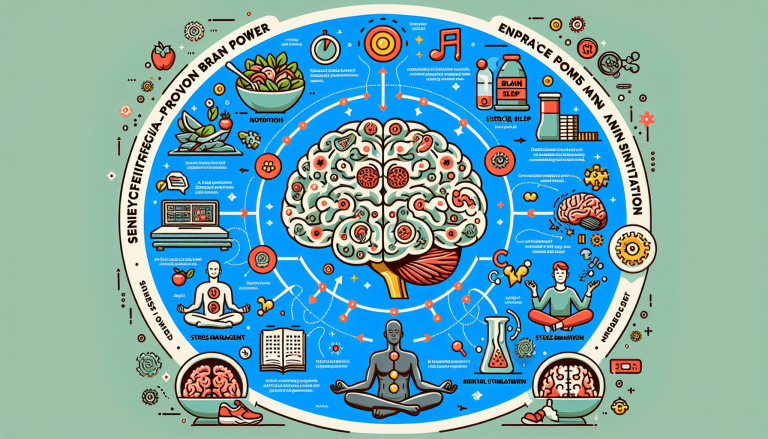Is It Too Late To Improve Brain Health?
In “Is It Too Late To Improve Brain Health?” you’ll discover that it’s never too late to start nurturing your mind. This insightful article delves into the strategies and habits that promote cognitive well-being, regardless of your age. You will learn about the brain’s incredible ability to rewire itself and the practical steps you can take to keep it sharp and vibrant. By understanding the latest research, you’ll find motivation to adopt healthier practices that can improve your mental vitality, ensuring a brighter, more engaged future.
Have you ever wondered if it’s too late to improve your brain health? It’s a common question, especially as we age or experience more stress in our lives. The good news is, it’s never too late to make positive changes. In fact, your brain is remarkably adaptable, and there are countless ways to enhance and maintain its health, no matter your age. Let’s explore this topic in more depth together!

Understanding Brain Health
Before diving into the how-tos, it’s important to understand what brain health actually means. Brain health refers to the functional state of your brain, which affects how you think, feel, remember, work, and play. A healthy brain can efficiently process and recall information, regulate emotions, and manage stress.
The Brain’s Plasticity
One of the most fascinating aspects of the brain is its plasticity, or neuroplasticity. This is your brain’s ability to change and adapt throughout your life. It means that even in your later years, your brain can create new neural connections, improve old ones, and adapt to new challenges.
Factors Affecting Brain Health
Several factors can impact brain health both positively and negatively. Understanding these can help you make decisions that promote brain health.
Genetics
Your genetic makeup plays a role in your brain’s functions and structure. However, genetics is only one piece of the puzzle, and lifestyle choices can significantly influence your brain’s health.
Lifestyle Choices
Lifestyle choices such as diet, physical activity, sleep, and social engagement can have a profound effect on your brain health. Here’s a simple table to summarize these factors:
| Factor | Positive Impact | Negative Impact |
|---|---|---|
| Diet | Diet rich in omega-3 and antioxidants | High sugar and processed foods |
| Physical Activity | Regular exercise | Sedentary lifestyle |
| Sleep | Consistent 7-9 hours per night | Poor sleep patterns or sleep disorders |
| Social Engagement | Strong social connections | Social isolation |
Mental and Emotional Health
Your mental and emotional state also plays a crucial role in brain health. Managing stress, practicing mindfulness, and keeping a positive outlook can boost your brain’s performance.
Environmental Factors
Your environment, including exposure to pollutants or toxins, can also affect brain health. Consider making your living space as clean and toxin-free as possible.
Strategies to Improve Brain Health
Now that we’ve covered what affects brain health, let’s look at some actionable strategies to enhance your brain’s well-being.
Nutrition for Brain Health
A balanced diet is one of the most effective ways to support your brain. You’ve probably heard the saying, “You are what you eat.” Well, it’s true for your brain as well.
Omega-3 Fatty Acids
These are vital for brain function. Foods high in omega-3s include:
- Fish like salmon and mackerel
- Flaxseeds and chia seeds
- Walnuts
Antioxidants
Antioxidants help protect your brain from damage. Include these foods in your diet:
- Berries (blueberries, strawberries)
- Dark chocolate (in moderation)
- Nuts and seeds
Vitamins and Minerals
Certain vitamins and minerals also play a key role in brain health. Ensure you’re getting enough:
- Vitamin E from nuts and seeds
- Vitamin B from whole grains and leafy greens
Physical Exercise
Regular physical activity not only keeps your body fit but also enhances brain function. Exercise increases blood flow to the brain, fostering the growth of new brain cells.
Types of Exercise
| Type of Exercise | Benefit |
|---|---|
| Aerobic (running, swimming) | Increases blood flow to the brain |
| Strength training | Improves cognitive function via muscle-brain signaling |
| Flexibility exercises | Reduces stress, improving mental clarity |
Mental Stimulation
Keeping your brain engaged with challenging activities can help maintain its health.
Puzzles and Games
Activities like crosswords, Sudoku, and puzzles can keep your brain sharp.
Learning New Skills
Learning a new language, playing a musical instrument, or even picking up a new hobby can stimulate your brain and create new neural connections.
Social Engagement
Humans are inherently social creatures. Interaction with others can help reduce stress and improve mental health.
Social Activities
Engage in activities such as:
- Joining clubs or groups
- Volunteering
- Attending social gatherings or events
Quality Sleep
Sleep is essential for brain health. During sleep, your brain clears out toxins and consolidates memories.
Tips for Better Sleep
- Maintain a consistent sleep schedule
- Create a relaxing bedtime routine
- Limit screen time before bed
Stress Management
Chronic stress can negatively impact brain health. Finding ways to manage stress can improve cognitive function and overall well-being.
Techniques for Managing Stress
| Technique | Description |
|---|---|
| Mindfulness Meditation | Practicing mindfulness to stay present |
| Yoga | Combines physical postures and breathing |
| Deep Breathing | Simple breathing exercises to reduce stress |
Common Myths About Brain Health
Let’s debunk some common myths that might be holding you back from taking steps toward better brain health.
Myth 1: You Can’t Teach an Old Dog New Tricks
Many people believe that age limits their ability to learn new skills or improve brain function. However, neuroplasticity shows us that the brain can adapt and grow at any age.
Myth 2: Brain Health Is Predetermined by Genetics
While genetics play a role, lifestyle choices significantly impact brain health, meaning you have more control than you might think.
Myth 3: Supplements Are the Best Way to Enhance Brain Health
Supplements can support brain health but shouldn’t replace a balanced diet, regular exercise, and other healthy lifestyle choices.

Warning Signs of Poor Brain Health
Recognizing symptoms early can lead to timely interventions. Here are some signs to look out for:
Memory Loss
Occasional forgetfulness is normal, but if it starts disrupting daily life, it might be a cause for concern.
Difficulty Concentrating
Struggling to focus on tasks or conversations can indicate underlying issues.
Emotional Instability
Frequent mood swings, irritability, or agitation can be signs of poor brain health.
Physical Symptoms
Physical symptoms such as unexplained headaches, dizziness, or fatigue can also be indicators.
When to Seek Professional Help
Sometimes, professional intervention is necessary to address brain health issues.
Cognitive Decline
If you notice significant cognitive decline or other severe symptoms, visit a healthcare professional for an assessment.
Mental Health Concerns
Conditions like anxiety, depression, or chronic stress often require professional treatment.
Neurological Symptoms
Unexplained neurological symptoms, such as frequent headaches or dizziness, warrant professional evaluation.
The Role of Technology in Brain Health
Technology can also play a significant role in maintaining and improving brain health.
Brain Training Apps
Apps like Lumosity and Elevate offer games and exercises designed to challenge your cognitive abilities.
Fitness Trackers
Wearable technology can help you monitor your physical activity, sleep patterns, and even stress levels.
Virtual Social Engagement
Online platforms can help you stay socially active, especially if in-person interactions are limited.
Conclusion
So, is it too late to improve your brain health? Absolutely not! Your brain is incredibly adaptable and responsive to positive lifestyle changes, no matter your age. By focusing on nutritious foods, regular exercise, mental stimulation, quality sleep, stress management, and social engagement, you can enhance your brain’s health and overall well-being. Remember, small, consistent steps can lead to significant improvements over time. It’s never too late to start—your brain will thank you for it!
Additional Resources
If you find yourself more confused lately, forget where you left small things like your phone or your glasses…. Words get stuck on the tip of your tongue or you don’t remember why you walked into a room…
>>>Watch this short documentary immediately because it may very well save your memory.
New Harvard research reveals this common household toxin wipes out your memory 3x times faster… Decreasing the blood flow to your brain and “violently attacking” your neurons and synapses on the hippocampus… This is the part of your brain that forms episodic memories, that makes you able to think and remember, literally…
Scientists from the National Institutes of Health warn that over 200 Americans are exposed to this toxin daily… And it’s the primary reason why every 66 seconds someone in the United States develops Alzheimer’s and 1 in 3 seniors ends up with some form of dementia.
Click below to find out all about it and what you can do to improve your memory:
Harvard: This common household toxin triggers memory loss







